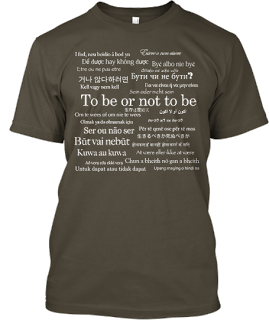 |
| The Universal Question |
UPDATE #2: We’re drawing to a close, with little less than a week to go. As of this update we’re at 57 and heading for 100 and truly need your help. People have begun telling me “Oh maybe everybody’s just waiting until the last minute.” Well I’m pretty sure the last minute is a Sunday night which is not exactly prime time for everybody to be online so you might discover Monday morning that your opportunity’s missed.
If you haven’t kept up on the news, more languages have been added and all known questionable translations have been fixed. The shirt is also now available in four colors (grey/black/red/blue) if that helps convince you.
UPDATE #1 : I am going to keep updating this post, keeping it sticky at the top of the page, until the campaign has run its course. This will help assure that newcomers see it, by keeping it on the homepage. We are at 15 out of 100 reservations, and need more people to see this!
Shakespeare truly is for everyone, and nothing demonstrates that sentiment better than his most famous quote of all, translated here into languages from around the world.
In celebration of Shakespeare’s birthday, show that you believe his works are just as relevant, powerful and important as they’ve ever been! Available for a limited time only!
Proceeds from this campaign go toward funding the mission of ShakespeareGeek.com, which for the last eight years has been dedicated to proving that Shakespeare makes life better.
Teespring is “Kickstarter for t-shirts”. We need a certain number of people, by a certain date, to commit to purchasing a shirt. If we reach that number (or exceed it!), everybody wins. If we don’t, nobody is charged. This method allows the price of each shirt to be greatly reduced, while keeping the quality of the product very high. (The graphics are all cleaned up by designers before printing, so they’re never pixelated or speckled like you sometimes see on traditional “upload and go” print on demand sites.)
If you are at all interested in owning one of these shirts (and possibly seeing other such campaigns) I strongly encourage you to sign up and help us get the word out through all your social media connections. Thanks as always for supporting Shakespeare Geek!

